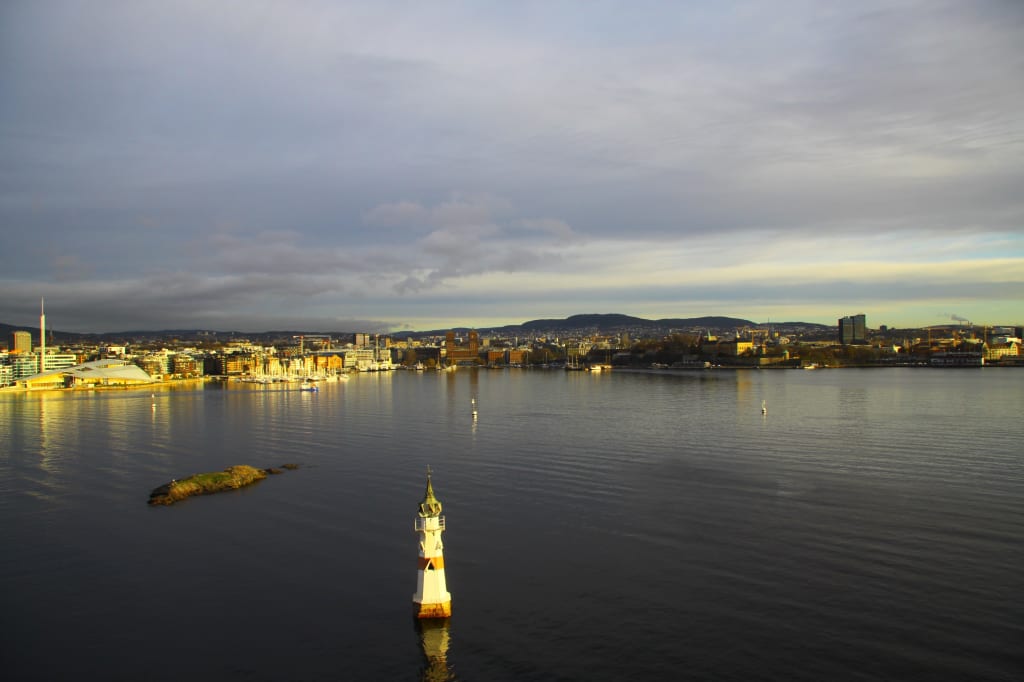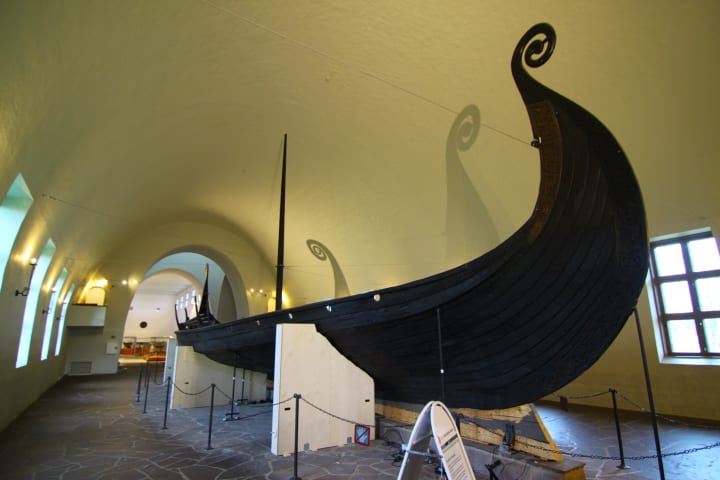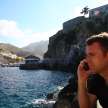Finding Your Way on the Whale-Road to Norway
What we do matters, even if no one sees it

We took a ship to Norway.
It took all night, its rusted white bulk pushing along a well-traveled path between two countries. The dark sea closed behind it, leaving no trace we were ever there.
Copenhagen was eerily like Vancouver. Right down to the endless bike lanes and the 7-Eleven on every corner. They even share the same statue, or one very similar. About the only difference is the mountains that Vancouver has, and Copenhagen lacks. And the fact that more people speak English in Denmark.
I had never slept on a ship before. My wife, veteran of many cruises, had. But this was no cruise ship. Our windowless cabin was just big enough to hold a narrow bed plus another above it that flopped down from the wall. There was a bathroom too, tiny enough to have come from an airplane. The TV on the wall showed the view outside, the sky darkening slower than the sea as the ship set out.
It turns out I don’t sleep well on ships. I was awake before dawn, standing on the top deck with my teeth aching in the cold wind off the sea. Colorful houses clung on to rocky islands just the way they do on Canada’s West Coast. Oslo lay curved like a sleeper around its bay, slowly awakening in the pure cold air.
Is there any better way to arrive in Norway?
The Norse have always been a seafaring nation.
In a high-ceilinged cruciform hall with bare white walls, ancient ships raise carved prows over the heads of gaping tourists. A thousand years ago, men set out to raid distant lands in these boats, no bigger than the bus that carried us to the museum through a rising fog.
It took days. And as the blade-grey sea rocked the boats, the Norsemen charted their course with stones that caught the salty sea light. No GPS. No compasses. Just an amalgam of desire and desperation, the guts to risk everything on a high and wild chance.
Every journey is a leap of faith. I hope I’ll never need the courage of my ancestors who set out in boats like this, not even knowing there was anything out there to find. The very first Vikings couldn’t know they would reach Britain or Ireland. And even once they found those rich lands, they kept going. Iceland. Greenland. Eventually even finding their way to Canada along the ice-choked whale road.
I don’t have that kind of courage, but I understand the impulse. The haunting call of the distant horizon. The need to see for yourself what lies beyond the stately gray curve of the earth. We know now what lies on either side of the singing sea, whether it’s Fukushima or the Faroe Islands. But the computers in our pockets did nothing to blunt the urge for discovery.
The same force that sends a pack of raiders across the ocean now fills the departure lounge with its coffee smell and recycled air. The world has changed. We haven’t.

By the time we reached the castle, it was raining.
Mute cannons pointed out at the indifferent sea, and the broad gray flagstones shone wetly. The castle and the hill it stood on were almost deserted.
Almost. But not quite. Because Akershus fortress, built around 1290 to protect the city from Swedish and Danish raids, is still the Norwegian prime minister’s office.
Boots banged on the wet pavement. The soldier didn’t look at us as we rounded the corner, rain thickening as heavy ranks of clouds rolled in from the sea. Water dripped from his beret and ran in thin shining rivers down his neck as he set off on patrol, following the same path drilled a hundred times before. Given long enough, his loud steps might wear a channel in the stone the way water does over time.
This was no parade. He carried a rifle slung over his shoulder, a bayonet fixed to its tip. If we hadn’t been there to see it, he would have done his duty just the same. Stamping along the wet pavement as though the rain didn’t exist. As though nothing mattered except his practiced progress through the gardens of the castle. Like the soldier of Pompeii’s bones that were found before the door he guarded, standing unrelieved as the ash began to fall.
We are small fish on this earth, for all the damage we are capable of. Our biggest ships are helpless in the hurricane. We leave no trace on an ocean that doesn’t notice a thing. Time and distance both worked to dwarf us, the vaulted ceiling of the cathedral an imitation of the black depths between cold stars.
What we do matters, whether anyone sees it or not. It becomes a facet of who we are, the telltale gene that shows the passage of Vikings across the North Atlantic. Old soldiers still remember how to march. Travel long enough, and you’ll always have a bag half-packed, a passport close to hand, vital information saved on your phone and uploaded to the cloud.
The ship that carried us back to Copenhagen sold duty-free beer, taking advantage of Norway’s non-EU status.
I drank lukewarm Heineken on my tiny bunk, listening to my wife snoring gently below me and watching the wobbly horizon on the tiny screen bolted to the wall. It’s not how the Vikings did it. But it was close enough for me.
And outside, the cold steel sea closed silently behind us. As though we were never there at all.
About the Creator
Ryan Frawley
Towers, Temples, Palaces: Essays From Europe out now!
Novelist, entomologist and cat owner. Ryan Frawley is the author of many articles and stories and one novel, Scar, available from online bookstores everywhere.






Comments
There are no comments for this story
Be the first to respond and start the conversation.